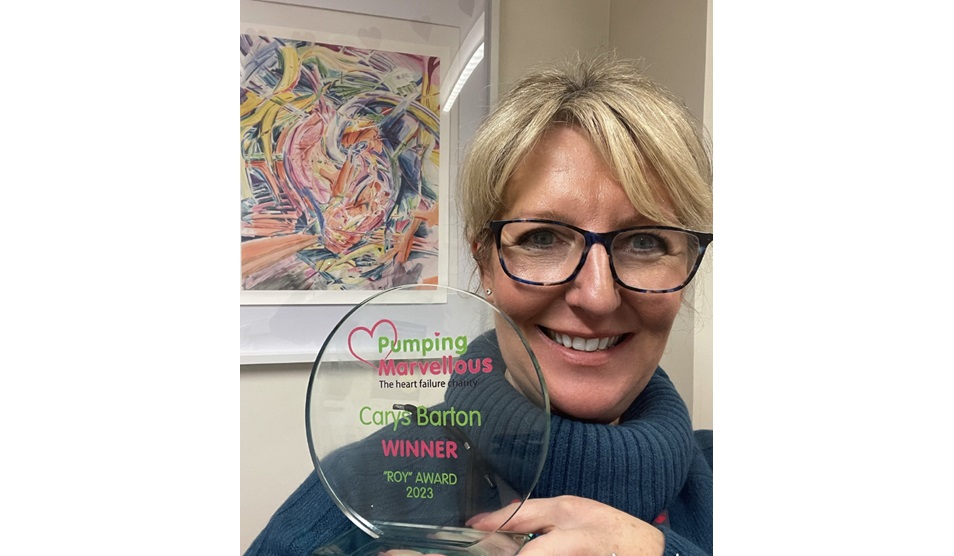Inherited cardiac conditions
Contact
- Outpatients appointments
- 020 3313 7367
- Advice for GPs
- 020 3312 3780
Visitor Information
Translation help:
To translate this page into your preferred language, click the Google Translate icon in the top-right menu and select your desired language.
Our inherited cardiac conditions service provides screening, diagnosis and support for patients with a broad spectrum of cardiac conditions. We see patients with heart muscle problems (cardiomyopathies) and heart rhythm problems (channelopathies).
Lead consultant Dr Amanda Varnava has extensive expertise in diagnosing and managing inherited cardiac conditions, while clinical nurse specialist Siân Jones is experienced in providing further support beyond the clinic setting. We work closely with our cardiac rehabilitation service team, which includes trained counsellors to provide exercise advice and psychological support. We also provide expertise in sports cardiology and are able to assess and guide individuals with concerns about heart disease and sports and exercise.
The service is one of only a few in the United Kingdom that the Department of Health recognises as fulfilling all the requirements to provide an inherited cardiac conditions service. We are proud of offering this service for both adults and children within the same Trust, which enables families to be seen together.
Conditions and treatments
We treat and manage a range of heart muscle problems or cardiomyopathies, including:
- hypertrophic cardiomyopathy
- arrhythmogenic cardiomyopathy (right ventricular cardiomyopathy or ARVC, and left ventricular cardiomyopathy)
- dilated cardiomyopathy (under 60 years of age)
- restrictive cardiomyopathy
- left ventricular non compaction
We also offer treatment and management for heart rhythm problems or channelopathies, including:
- long QT syndrome (LTQS)
- Brugada syndrome
- catecholaminergic polymorphic ventricular tachycardia (CPVT)
- short QT syndrome (SQTS)
We also care for patients with inherited aortopathies such as Marfan syndrome, and neuromuscular disorders that may affect the heart such as myotonic dystrophy and Friedreich’s ataxia.
Genetic testing may be available for some individuals – we discuss this with patients during their clinic appointments.
Clinics
Inherited cardiac conditions
Address
Inherited cardiac conditions department
Peart-Rose clinic
Ground floor
Area C
Hammersmith Hospital
London
W12 0HS
Hours
09.00 to 16.00 on Mondays, 09.00 to 13.00 on Thursdays
Paediatrics inherited cardiac conditions
Address
Department of paediatrics
St Mary’s Hospital
Praed Street
London W2 1NY
Hours
09.00 to 13.00 on the first Wednesday of the month
Contact details
Dr Amanda Varnava's secretary
Phone: 020 3312 3780
Siân Jones, clinical nurse specialist
Phone: 07768 980 832
Email: imperial.ICC@nhs.net
Meet the team
Consultant cardiologist and lead for inherited cardiac conditions
Dr Amanda Varnava, clinical lead
Clinical nurse specialist for inherited cardiac conditions
Siân Jones
Patient information
Before your appointment
You may be asked to come to hospital for additional tests before your clinic appointment including an echocardiogram (cardiac ultrasound), heart monitor (small portable machine), an exercise stress test (a treadmill machine with the ECG attached) or blood tests. The results of these tests will be available at your appointment.
You are welcome to call the clinical nurse specialist before your appointment to discuss what will happen or to pass on any information about your family’s health.
Family history
Please bring a detailed family history with you to your clinic appointment. This should include information about the health of your immediate and extended family. This information helps us to identify any previous family history which may be linked.
Please include information about sudden deaths (including cot death, car accidents, drowning), miscarriages and sudden infant or childhood deaths in your family history. If you have copies of post-mortem and/or coroners’ reports for any deceased relatives, please bring these with you. If your family member has been diagnosed with a condition please bring their information or clinic letters if they agree to share these with you. All information will be kept strictly confidential.
During your appointment
Appointments can take up to two and three hours, as some tests are required on the same day. The department often gets very busy and you may have to wait longer. Please be patient while we get all of your results together so that we can give you a complete assessment.
Genetic testing may be available for certain conditions and we will discuss this with you during your appointment. There are many implications to consider before having such a test and our team will support you through these decisions.
We have play specialists available in our family clinic to help make your visit as easy as possible – please let us know if you would like us to arrange this for you.
Cardiac screening tests
Everyone attending our clinic will have an ECG and echocardiogram:
An ECG records the electrical signal as it is conducted throughout the heart. An ECG is entirely safe, not painful and only takes a few minutes.
An echocardiogram is an ultrasound scan of the heart. A picture of the heart is produced from which an accurate assessment of the size and function of the heart can be made. The scan takes from 30 to 40 minutes and is not painful.
Other tests that may be required include:
A 24/48-hour ECG recording (or Holter) is an ECG monitor that continuously records the heartbeat over 24 or 48 hours. You wear the monitor under your clothes and can continue with normal daily activities, including exercise.
An exercise test (ETT) assesses the rhythm and function of the heart at a faster rate, while on a treadmill. Blood pressure is monitored during the test. The test takes approximately 45 minutes and allows symptoms not obvious at rest to become apparent when the heart is working harder. We recommend you wear loose comfortable clothing and trainers for this test.
An MRI scan uses a magnetic field to take pictures of your heart. You will be required to lie on a bed within a tunnel. You will have a contrast injection to enable us to see your heart more clearly. An MRI scan usually lasts between 40 minutes to an hour.
After your appointment
If we diagnose an inherited heart condition, we will plan your care based on the results of your tests, your medical history and any effect the condition may have on your daily life. Many conditions will require regular monitoring and some may need treatment with medicines.
It can be difficult to come to terms with learning that you may have inherited a heart condition, or that other family members may have inherited a heart condition. Our nurse specialist specialises in the care of those with inherited conditions. We can also give information about charity organisations who offer support.
If no heart condition is found we may still keep you under review on an outpatient basis.
The team will send you and your GP a copy of your clinic letter.
When someone is diagnosed with an inherited cardiac condition it is advised that their first degree family members (parents, siblings, children) be assessed for the same condition. In order to help this process we will give you a letter to pass on to your relatives’ GPs.
Learn more about inherited heart conditions
Further information and support
If you have any questions or would like some more information, please contact our clinical nurse specialist on 07768 980 832. You can also email the service at imperial.icc@nhs.net.
Further online resources
- Sudden Adult Death Trust
- Cardiomyopathy Association
- Cardiac Risk in the Young
- Marfan syndrome
- Winston's Wish (for bereaved children)
Refer to this service
GP
Please use NHS e-Referrals to refer a patient to our inherited cardiac conditions service.
Clinical trials and research
We have established a research programme which looks to identify risk factors in patients found to have an inherited cardiac condition. This research aims to utilise novel electrical testing to discriminate between high and low risk patients.
With the acquisition of the latest genetic sequencing technology we are now developing research into the genetics of all inherited cardiac conditions and some arrhythmia syndromes. The unique combination of this electrical testing, genetic facility and our expert team has allowed us to develop a world-class research programme.
Latest news See all news
-
 Read the full story
Read the full storyHeart health check pop-up coming to Portobello Road Market
Members of our cardiac team and other local NHS teams will be joining forces with a national charity to offer free heart health checks to the public at Portobello Road Market on Wednesday 29 May, between 10am and 2pm. The Pumping Marvellous…
-
 Read the full story
Read the full storyHeart failure nurse wins national award from charity
Carys Barton, a consultant nurse in heart failure at Imperial College Healthcare NHS Trust, has won a Roy Award from the Pumping Marvellous Foundation in recognition of her outstanding contribution to heart failure services. The Roy Award is an…
